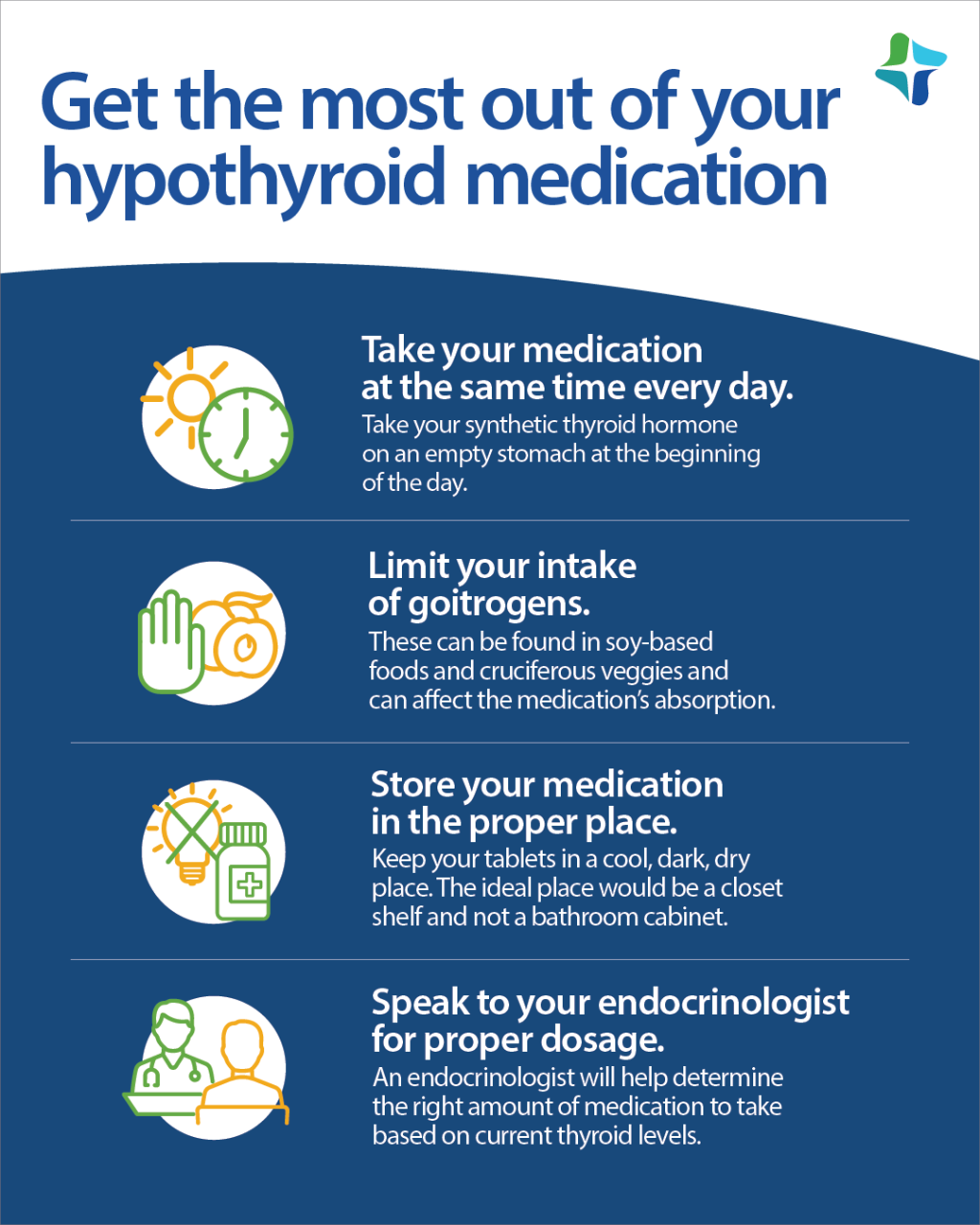Are you experiencing symptoms like fatigue, extreme sensitivity to cold, and weight gain? These are all signs of hypothyroidism, meaning your thyroid gland doesn’t produce enough of the hormones as it should. It is important to regulate this hormone for your body to function properly. When your body can’t make enough T4 or the thyroid hormone thyroxine, you can use medication to correct this problem.
What is synthetic thyroid hormone?
Levothyroxine is a common term for any synthetic version of the thyroid hormone and is considered the standard treatment for hypothyroidism. Despite being artificial, the medication mimics the natural hormone and regulates proper functioning. Six FDA-approved brands of synthetic T4 supplements are available, including Levo-T, Levothyroxine Sodium, Levoxyl, Novothyrox, Synthroid, and Unithroid. The main difference between these brands is the portion of the hormone that enters the bloodstream at a given time after ingestion. It’s important to speak with an endocrinologist or primary care physician about which synthetic thyroid hormone would be best for you.
What is hypothyroidism?
Hypothyroidism, or an underactive thyroid, means that your thyroid does not produce enough hormone to keep the body functioning normally. Common symptoms include dry skin, fatigue, constipation, feeling cold, and depression. Treatment includes medication like synthetic thyroid hormone.
What can prevent my synthetic thyroid hormone from working properly?
Several different factors can affect the strength of your synthetic thyroid hormone. Some of the most common mistakes include:
- Taking your medication at the wrong time. Levothyroxine should be taken on an empty stomach for best absorption into the bloodstream, either 30 to 60 minutes before breakfast or three hours after dinner.
- Switching synthetic thyroid hormone brands. Based on the availability of the synthetic hormone that enters the bloodstream upon ingestion, it is best not to change brands of synthetic T4 once you begin taking the hormone.
- Overindulging in certain foods. Limit your intake of foods that contain goitrogens like soy-based products and certain beverages (coffee, tea, and alcohol). A proper hypothyroidism diet includes whole eggs, lean meats, fish, gluten-free grains and seeds, dairy, and non-caffeinated beverages.
- Storing your levothyroxine tablets in the wrong place. Avoid storing the synthetic hormone in the bathroom medicine cabinet, but rather a cool, dark, and dry environment like a closet shelf or bedside table.
- Mixing levothyroxine and “natural” thyroid medications and supplements. Often, these “natural” supplements don’t list all of the thyroid hormones included on the labels, meaning you could get too much of the T4 hormone.
What supplements should you not take with thyroid medication?
Iron and calcium supplements interfere with how the body absorbs synthetic thyroid medication. These, along with antacids and cholesterol drugs, should be taken four hours before or after ingesting thyroid medication. It’s important to understand what’s in the water or beverage you take your medication with. Some bottled waters and tap waters may be fortified with these ingredients; check the nutrition label or water supply to check for iron or any other supplements.
Pro tip: Take your meds with 100% pure apple juice, not from concentrate, since it does not naturally have these minerals in it.
Tips to get the most out of your synthetic thyroid hormone from an endocrinologist
Taking your medication while eating breakfast or missing a dose can cause a bigger impact on your thyroid function than you might think. Follow these five simple tips to get the most out of your synthetic thyroid hormone medication and avoid thyroid-related symptoms like trouble sleeping or anxiety.
- Stick to a schedule. Having a routine and taking your meds at the same time each day will make it less likely that you forget to take your thyroid hormone. We recommend taking it first thing in the morning.
- Take the synthetic thyroid hormone on an empty stomach. It is important to time this hormone absorption around meals and other meds. Take the synthetic hormone with a glass of water in the morning and wait about 30 minutes before eating breakfast.
- Don’t take other medications right away. Speak with your endocrinologist or primary care physician about any and all medications and supplements you’re taking to plan out the best schedule.
- Use a pillbox. Life gets hectic, and it’s easy to forget if you actually took your meds or not. A seven-day pill organizer can be a big help in keeping track of everything.
- Set up auto-refill for your prescription. Lessen the chance of missing a dose by setting up automatic refills at your pharmacy for your synthetic thyroid hormone and any other medications you take on a regular basis.
The most important tip we can offer is to be in regular contact with your endocrinologist, especially when first diagnosed. This communication allows you to make sure the dosage you’re taking is working correctly and ask as many questions as you want. Schedule an appointment with a St. Joseph and Texas A&M Health Network primary care physician today to talk more about hypothyroidism and synthetic hormones.





